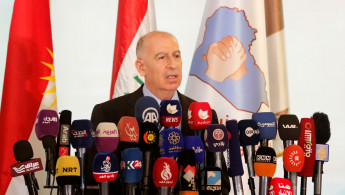'Shia militias are nation's biggest threat,' says Iraqi vice president
In Washington for talks this week with Trump administration officials and congressional leaders, Iraqi Vice President Osama al-Nujaifi is hoping the administration will deliver on pledges to counter Iran's growing influence inside Iraq and across the Middle East.
Al-Nujaifi is one of Iraq's three vice presidents, and his brother heads a prominent Iraqi defence faction. Both have been represented in Washington by the same lobbyist employed last year by Michael Flynn, US President Donald Trump's first national security adviser. In February, Trump fired Flynn, who is now under investigation by special counsel Robert Mueller.
In Tuesday remarks at the US Institute of Peace, al-Nujaifi described Shia militias in Iraq operating as a "parallel army" that could divide the nation even as Iraq's military is driving out Islamic State fighters with the aid of American troops.
The Iranian-backed factions "have gained a lot of power and maybe they can pose more problems," al-Nujaifi said.
In an interview with The Associated Press and in an earlier draft of his remarks, al-Nujaifi was more explicit about his interest in securing military aid for Iraqi Sunni factions overmatched by Iran's equipping and training of Shia militias.
"More attention should be paid to the strengthening of military capabilities of the people of former IS-occupied areas, training and enabling them to defend their areas," his speech says, according to a draft provided to AP. He was referring to mostly Sunni areas recently liberated from IS fighters.
Al-Nujaifi suggested deploying more American military forces. The Pentagon has authorised more than 2,000 additional troops to Iraq since President Donald Trump took office in January, but analysts aren't expecting any new, significant surge.
"I presume his pleas will be met with collective eye-rolling," said Michael Knights, a Mideast analyst at the Washington Institute for Near East Policy.
In a nod to Iraq's 2018 national election and his likely role in it, he said a new coalition party knitting together Sunni, Shia, Kurdish and Christian factions would stand the best chance of acting as a bulwark against the militias. Iraq's current government is already a coalition, though often wracked with political turmoil.





 Follow the Middle East's top stories in English at The New Arab on Google News
Follow the Middle East's top stories in English at The New Arab on Google News


